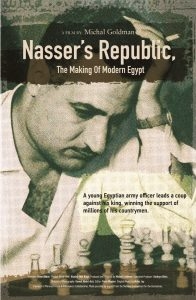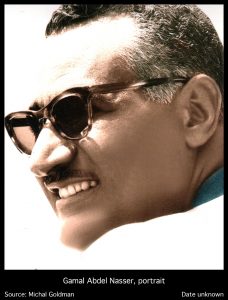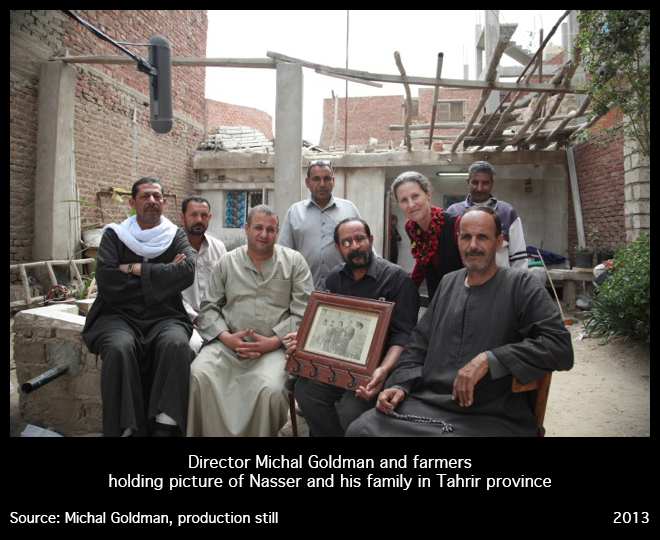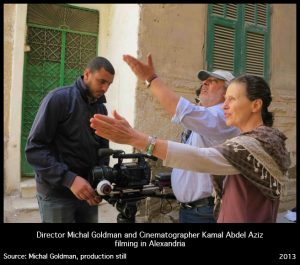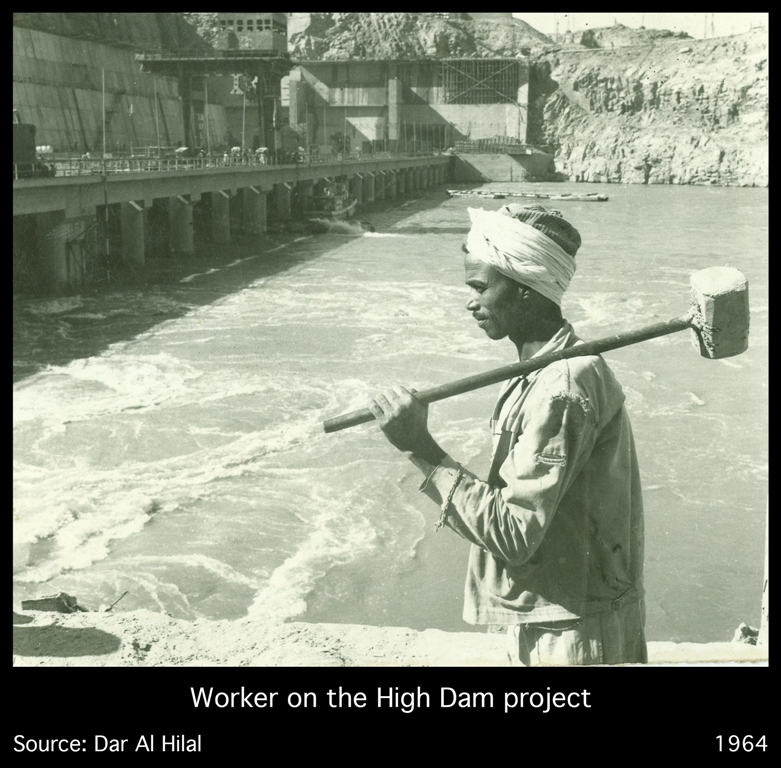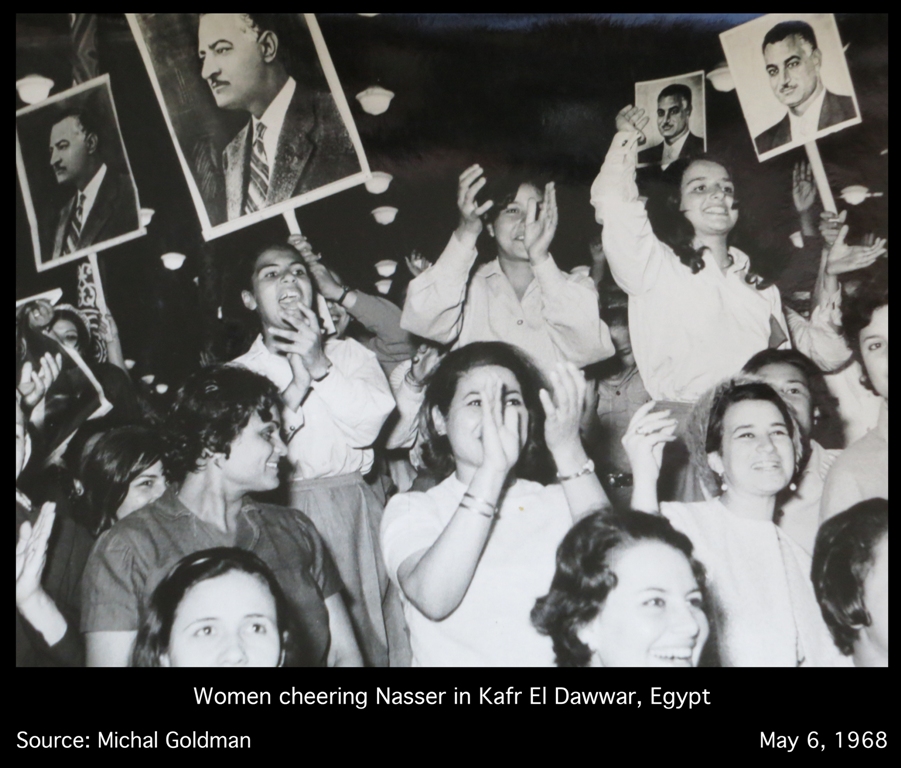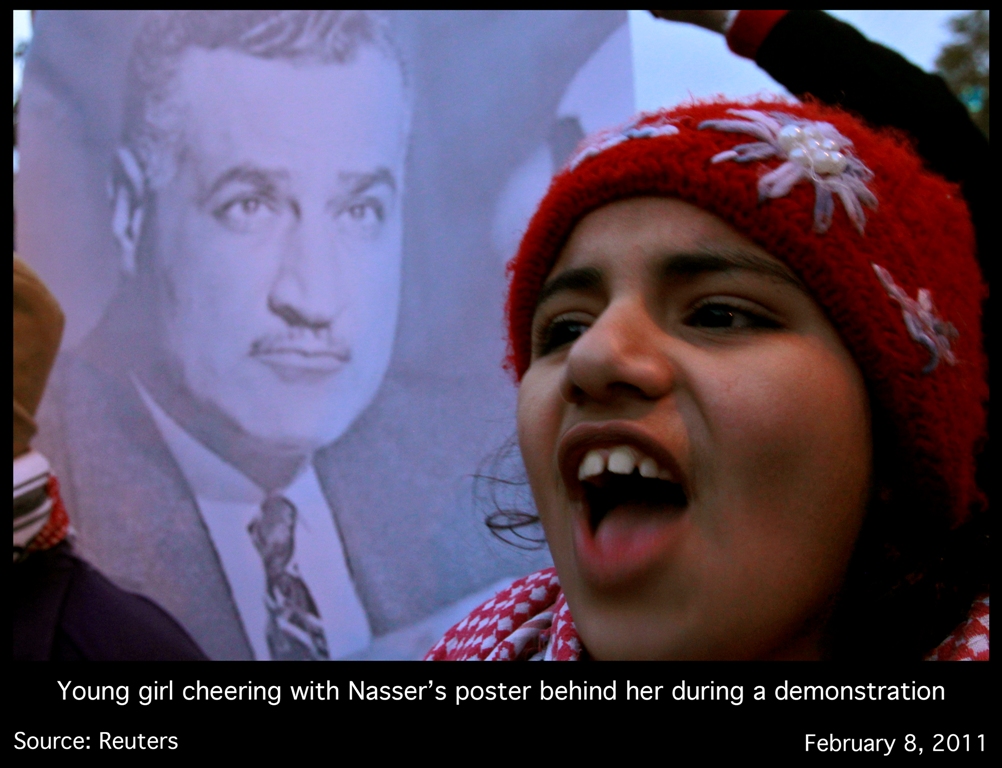The American documentary film The Republic of Nasser, birth of a modern Egypt(Nasser’s Republic: The Making of Modern Egypt) of Michal Goldman was projected during the 38th edition of the Cairo Film International Film Festival (CIFF) In the “International Panorama” section.
Mic Hal Goldman, independent director of documentary films, began her work at the time of the Civil Rights Movement in the USA. In the 1990s, she settled in Cairo for a few years and took the opportunity to make her film Oum Kalthoum, a voice like Egypt (Umm Kulthum, A Voice Like Egypt) on the largest diva in the Arab world. Nasser is his first political film, both in the US as well as in Egypt.
It is an 80 -minute documentary, filmed between 2011 and 2015, which chronologically traces the political life of Gamal Abdel Nasser, with interviews, old photos, archive videos and supporting testimonies. The narration was provided by the Palestinian actress Hiam Abbass and the voice in English of Gamal Abdel Nasser by the Egyptian actor Khaled Abol Naga.
In 1952, Gamal Abdel Nasser, a young Egyptian colonel, led a coup transformed into a revolution. For 18 years, he will challenge the cultural hegemony of the Western world, to fight against Islamism, to establish the first authoritarian military regime and to face the deep divisions which tear the Arabs. A charismatic man at the enormous ambition, Nasser began a revolution that he could not complete. Caught in the cogs of his power, he will die at the age of 52 before realizing all his dreams. Today Egypt is faced with its inheritance.
Not being Egyptian and not particularly knowing the history of this country, I found the film rather complimentary, highlighting the qualities of this Arab leader. It is only towards the end that he insists that Gamal Abdel Nasser not only failed to implant a democracy, but that he on the contrary laid the foundations for an authoritarian regime whose current situation of Egypt is largely the result.
The projection was followed by a heated and even violent debate.
After presenting his film, Michal Goldman said it was made for an American audience. Indeed, through this documentary, she wanted to show the role of this Egyptian leader in the history of the Arab world to her fellow citizens, especially those under the age of forty, have never heard of Nasser, or know only what was told by the British who only gave their own version of history.
The director explained that during her stay in Egypt in the 1990s, she fell in love with it and wanted to share with her compatriots what she had felt towards this country. Especially since she said, politically the Americans had really failed with Nasser and she wanted the young people of her country to know this and understand that the Americans had not been up to the task.
“These new generations must know that we are responsible, because everything has consequences and if today Arabs hate us, they have real reasons,” she said. “When I was in Egypt in 1992 I listened to Oum Kalthoum a lot, his songs were everywhere and I found that it was a good way and pretext to introduce Egyptian history and culture to the Americans. So I had made this film on her. Today, I wanted to go a little further and make this country known even more to my fellow citizens. Let them know that what is happening in the Arab world is currently the consequence of the choices of our rulers in the past. ”
Some of the presents have taken the floor, some to thank the director for her work, others to criticize her.
The film was criticized for having obscured certain facts, for having distorted others, and of having insisted on certain aspects and not on others. We notably blamed the director for not having talked enough about the role of the Muslim Brotherhood who systematically undermined Nasser’s work because he had refused to be part of the Islamic alliance and not to have insisted on the will of this brotherhood to kill Nasser. He was also criticized for not having spoken of the communists, the movements of the students, the very abundant correspondence (about a hundred letters) between the American president John Kennedy and Gamal Abdel Nasser, of the Yemen….
To all these reproaches, the director replied that she had filmed hours and hours but kept only 80 minutes. The Nasser period having been too long and too rich, there was too much to put and it was therefore necessary to synthesize. For example, she had chosen to speak only of a single attempt to assassinate Nasser by the Ekhwens, not all, because that is enough to understand the situation.
A spectator took the floor and asked Michal Goldman to tell young Americans, in a next film, that if the Arabs hate them so much, it is because America hates Arabs. Perhaps not the people, but surely the various governments and that it is indeed the Americans who destroyed Iraq, who finance Daesh and who are always on the side of Israel whatever it does. For him, the hands of the Americans are dirty.
A lady chained by shouting in a very aggressive way, that the film is full of lies, that during the nasser period there was no censorship and that there was a real democracy in Egypt.
A spectator tried to calm her down, he added that he wanted to thank the director for having accomplished this work which participates in making the history of Egypt known and especially in preserving part of his memory and heritage, especially since the films on Nasser are rare, and that he is all the more important as the director has done a very good work as a documentalist and put several rare photos. Two or three speakers went in the same direction and claimed to have found the film good, even if he showed that Nasser laid the foundations for authoritarianism, he also insisted on his successes and his desire to make Egypt an independent and modern country, and that if he has not completely succeeded, at least he did everything possible.
But the lady was screaming again and again. The debate became stormy, with cries, howls, people who did not get along, accusations that history has been manipulated … Finally the whole room had to be evacuated.
Despite all this Michal Goldman has not lost his cold and replied that this film shows only one aspect of Nasser’s life and that the Egyptians should do others to show even more and talk about their inheritance. She said that when she had made the film on Oum Kalthoum, she had been made a lot of reproaches for not having talked about other aspects of the diva, such as her lesbianism or the fact that she did not pay her musicians…. “But, added, it is to you, Egyptians, to make all this, films and more films, on Nasser, on Oum Kalthoum and on all your heritage, and it is still up to you to tell your story as you know it. Why are you not making your own movies if you find that my film deforms it? ”.
The director’s composure in the face of the aggressiveness of which she was the object impressed me and her very relevant response challenged me. Indeed, why wait for foreigners to talk about our history? Why not do it ourselves? Why not multiply these documentaries or films which would retrace whole sections of our history, as well for ourselves and for new generations, and to make us known abroad, to discover our history as we understand it and as we have experienced it and thereby make our heritage and our culture appreciate? Such films exist of course, we can cite as an example precisely two Egyptian films, such as Jews from Egypt (Jews of Egypt) of Amir Ramses or more recently We are Armenian Egyptian (We are egyptian armenians) by Waheed Sobhi, Eva Dadrian and Hanan Ezzat, moreover scheduled in this same “International Panorama” section of this same festival, but it would be necessary to multiply such initiatives/projects/documentaries.
Then, why don’t we know how to appreciate the efforts made by others? Why is it instead of renting their good intentions and the actions they perform for us? Here is a director who falls in love with one of our countries, who wants to share this love and help, in return she is overwhelmed with reproaches and is attacked by people who do not take any initiatives themselves and who do nothing concrete. For what? Why not thank this person and try to collaborate with them to carry out other projects?
And finally, why don’t we know how to debate calmly and politely? Why do we always give ourselves this negative image of a people who do not know how to listen or discuss calmly and who do not know how to argue? Why does a simple debate on a film end in this shameful way?
It’s really a shame!
After the evacuation of the room, I was able to approach the director and ask her three small questions.
You say you made this film for the Americans, have they seen it? What did they think? How did they find it?
The film was screened in the USA and even several times in Boston. The Americans really liked it, above all, and as I had wished, he made them understand several things that they ignored, in particular the reasons why the Arabs react today in this way, how the bases of authoritarianism were established in the Arab world and the why of this exacerbated anti -colonialism …
Some spectators have reproached you for historical errors. I myself am unable to know if this is the case, but do you think you really did it?
The shooting began in 2011 with interviews here in Egypt, I have hours and hours of recordings. Then for 5 years, there were exchanges of email, research of documents, archives….
I worked with nine historians who checked everything as research and film progress. Thereafter, they all saw and reviewed the film three or four times to verify that there is no historical error.
Why did you choose these two actors to make the voices? What about the female voice, why not an Egyptian woman?
I didn’t want to choose Americans, but moreover I didn’t want any accent. I also wanted voices in harmony with the film. I listened to hours and hours of recordings of actors.
For the female voice, I did not find an Egyptian who has a good English, without accent and which is quite mature. Hiam Abbass’s voice is a mature voice, it’s a real woman and that’s what I wanted for the film.
I chose Khaled Abol Naga Because I find that his voice on recording sounds very well. He speaks perfectly English but with a slight British accent. He had to work for several days to get rid of this accent and completely enter the role. The result is excellent, his voice is in perfect harmony with the film. We feel that he has entered the character’s skin. He did a very good job, especially since we had recorded a week after the death of his sister in a fire and that he was very affected.
Neïla Driss
Read on the same subject:


